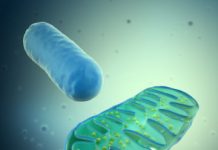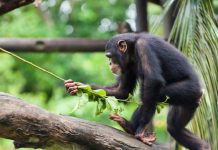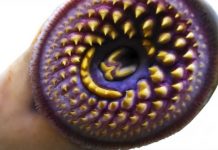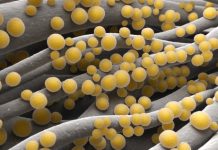Research: Massive Laki volcano eruption led to unusually cold winter in Europe —
An enormous volcanic eruption on Iceland in 1783-84 did not cause an extreme summer heat wave in Europe. But, as Benjamin Franklin speculated,...
Research: Mapping microbial symbioses in forests —
In and around the tangled roots of the forest floor, fungi and bacteria grow with trees, exchanging nutrients for carbon in a vast,...
Research: How egg cells choose their best powerhouses to pass on —
Developing egg cells conduct tests to select the healthiest of their energy-making machines to be passed to the next generation. A new study...
Research: Captive chimpanzees spontaneously use tools to excavate underground food —
Chimpanzees in captivity can successfully work out how to use tools to excavate underground food, even if they've never been presented with an...
Research: Jawless fish take a bite out of the blood-brain barrier —
A jawless parasitic fish could help lead the way to more effective treatments for multiple brain ailments, including cancer, trauma and stroke.
One major...
Research: Researchers develop new laser microscope that could be ‘revolutionary’ for treatment of diseases...
University of British Columbia researchers have developed a specialized microscope that has the potential ability to both diagnose diseases that include skin cancer...
Research: Neanderthals and modern humans diverged at least 800,000 years ago, research on teeth...
Neanderthals and modern humans diverged at least 800,000 years ago, substantially earlier than indicated by most DNA-based estimates, according to new research by...
Research: From Earth’s deep mantle, scientists find a new way volcanoes form —
Far below Bermuda's pink sand beaches and turquoise tides, geoscientists have discovered the first direct evidence that material from deep within Earth's mantle...
Research: On the way to fighting staph infections with the body’s immune system —
Researchers have gained a greater understanding of the biology of staphylococcus skin infections in mice and how the mouse immune system mobilizes to...
Research: Extreme hot days will dramatically increase, especially in low income counties —
While extreme cold and snow often make headlines in the Northeast, by 2060, there will be far more record heat. Imagine the most...
Top News
Hey ISIS, You Suck: Local Muslims Post Anti-ISIS Billboard
A new billboard on Manchester Road in Missouri reads, "HEY ISIS, YOU SUCK!!! From: #ActualMuslims."
A group of Muslim-Americans have put up a blunt billboard...





















